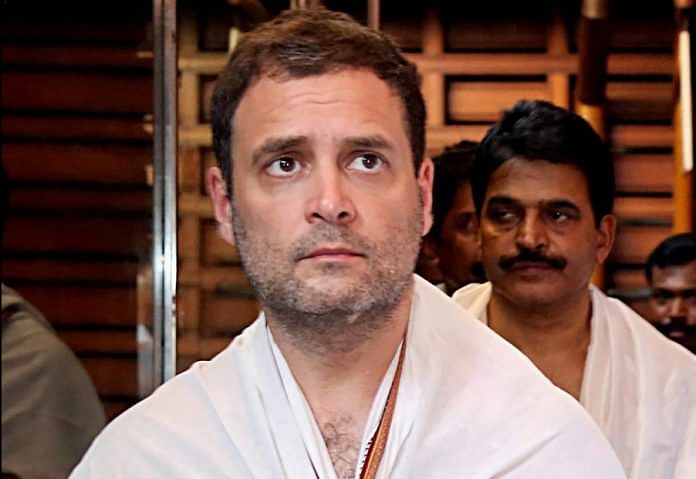Acting on advice of its regional leaders, Congress snubbed pre-poll feelers from the JD(S) but had they contested together, they would have secured 150 seats.
New Delhi: Rahul Gandhi is an earnest campaigner in election after election but time and again, the Congress president, in his attempt to strengthen his party, has failed to address a stumbling block in the Congress’s push for power — small fringe players who scuttle the party’s chances of poll victories.
In Karnataka, just as in Gujarat and in the recent bypolls in UP, Rahul went with the overconfidence of his state leaders and didn’t cede ground to regional parties. Months before the assembly polls were announced, the JD(S) sent feelers to the Congress but state party leaders including Chief Minister Siddaramaiah convinced Rahul Gandhi that the regional party would be wiped out and that there was no need to ally with it.
With the Congress having ignored it, the JD(S) forged an alliance with the BSP, the first pre-poll alliance by the BSP in long time, and today, the Congress has been forced to not only extend support to the JD(S), but has also had to offer the chief minister post to H.D. Kumaraswamy. This despite the JD(S)’s tally of 37 seats being less than half of what the Congress secured (78 seats).
From the results, it is clear that had Congress and JD(S) contested together, they could have won in 34 more seats and secured a clear majority. During the last Parliament session, West Bengal Chief Minister and TMC leader Mamata Banerjee, who had met opposition leaders in Delhi, urged the Congress to tie up with the JD(S) in Karnataka. Once the results began coming in, Mamata was quick to tweet Tuesday: “If Congress had gone into an alliance with the JD(S), the result would have been different. Very different.”
Even during the campaigning in Karnataka, Rahul Gandhi had said that if the Congress became the single largest party, he could be the next Prime Minister. The Congress, it seems, is still not ready to accept the fact that its role and importance as a leading national party has suffered strongly in the last four years, even after being reduced to governing just three states in the country.
“There are times in the history of electoral democracy, when a defeat teaches you more than a victory,” says Manoj Jha, senior RJD leader and Rajya Sabha MP. “The Congress must engage with all the opposition parties in stitching a social coalition.”
In Karnataka as in Gujarat
Karnataka is not the only one state where the party has ignored small and fringe players. In Gujarat, the BSP and the NCP bargained hard for just a few seats in an attempt to form an alliance with the Congress. But the state Congress leadership convinced Rahul that the party could do without sharing seats with the two smaller players on the grounds that they had almost no say in the state’s politics. The result was that in 12 seats, the Congress lost only because of vote division by the BSP and NCP. Had they fought together, the party could have formed the government in the state.
“The lesson for the Congress is that it should realise the importance of small and regional parties and should embrace them if at all it wants to topple the BJP,” says Majid Memon, senior NCP leader and Rajya Sabha MP. “The recent few results show that if the opposition unites, it can take on Modi strongly. But for that, everyone will have to keep aside their vested interests.”
Rahul’s approach of strengthening the Congress by constantly ignoring possible partners has put in party in peril and is also in stark contrast to the approach adopted by his mother, former Congress president Sonia Gandhi, who has been working hard to bring the opposition together. In recent times, Rahul has tried to warm up to leaders like Sharad Pawar and Lalu Yadav but he still needs to mend his approach in order to gain currency among the senior regional satraps. Even in Karnataka, it was Sonia Gandhi who called H.D. Deve Gowda to offer support for the government formation. As a party president, it was a call to be taken by Rahul Gandhi.
In UP, a similar tale
Rahul could also have easily shown large heartedness in the recent by-elections in UP. Despite having a remote chance of winning, the party put up candidates in Gorakhpur and Phulpur; UP Congress president Raj Babbar had argued that as a national party, the onus was on the Congress to contest every election or it would demoralise workers. While the remaining opposition united to defeat the BJP, Congress candidates lost their deposits in both seats.
This has reduced the Congress’ bargaining power in UP where long-time rivals, the SP and BSP, came together. The Congress, however, effected a course correction by voting for the BSP candidate in the Rajya Sabha elections.
The Karnataka elections have given a clear message that wherever possible, the Congress will have to accommodate smaller parties and will have to curb its tendency of contesting in maximum number of seats. “Winnability and not the number should be the criteria,” says Jayant Chaudhary, senior RLD leader. His party is contesting the Kairana bypolls supported by SP.
In Madhya Pradesh, new Congress president Kamal Nath is planning to ally with the BSP, which has been a hurdle for the Congress in the last three assembly elections.



